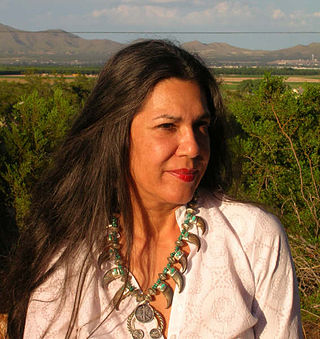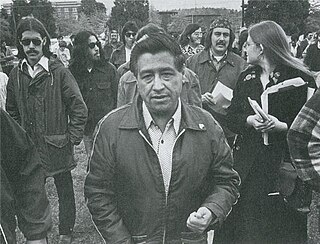
Chicano or Chicana is an ethnic identity for Mexican Americans who have a non-Anglo self-image, embracing their Mexican Native ancestry. Chicano was originally a classist and racist slur used toward low-income Mexicans that was reclaimed in the 1940s among youth who belonged to the Pachuco and Pachuca subculture. In the 1960s, Chicano was widely reclaimed in the building of a movement toward political empowerment, ethnic solidarity, and pride in being of indigenous descent. Chicano developed its own meaning separate from Mexican American identity. Youth in barrios rejected cultural assimilation into the mainstream American culture and embraced their own identity and worldview as a form of empowerment and resistance. The community forged an independent political and cultural movement, sometimes working alongside the Black power movement.

Tejanos are descendants of Texas Creoles and Mestizos who settled in Texas before its admission as an American state. The term is also sometimes applied to Texans of Mexican descent.

Rudolfo Anaya was an American author. Noted for his 1972 novel Bless Me, Ultima, Anaya was considered one of the founders of the canon of contemporary Chicano and New Mexican literature. The themes and cultural references of the novel, which were uncommon at the time of its publication, had a lasting impression on fellow Latino writers. It was subsequently adapted into a film and an opera.

Cherríe Moraga is a Xicana feminist, writer, activist, poet, essayist, and playwright. She is part of the faculty at the University of California, Santa Barbara in the Department of English since 2017, and in 2022 became a distinguished professor. Moraga is also a founding member of the social justice activist group La Red Xicana Indígena, which is network fighting for education, culture rights, and Indigenous Rights. In 2017, she co-founded, with Celia Herrera Rodríguez, Las Maestras Center for Xicana Indigenous Thought, Art, and Social Practice, located on the campus of UC Santa Barbara.

Ana Castillo is a Chicana novelist, poet, short story writer, essayist, editor, playwright, translator and independent scholar. Considered one of the leading voices in Chicana experience, Castillo is most known for her experimental style as a Latina novelist and for her intervention in Chicana feminism known as Xicanisma.

Caló is an argot or slang of Mexican Spanish that originated during the first half of the 20th century in the Southwestern United States. It is the product of zoot-suit pachuco culture that developed in the 1930s and '40s in cities along the US/Mexico border.

Chicanismo emerged as the cultural consciousness behind the Chicano Movement. The central aspect of Chicanismo is the identification of Chicanos with their Indigenous American roots to create an affinity with the notion that they are native to the land rather than immigrants. Chicanismo brought a new sense of nationalism for Chicanos that extended the notion of family to all Chicano people. Barrios, or working-class neighborhoods, became the cultural hubs for the people. It created a symbolic connection to the ancestral ties of Mesoamerica and the Nahuatl language through the situating of Aztlán, the ancestral home of the Aztecs, in the southwestern United States. Chicanismo also rejected Americanization and assimilation as a form of cultural destruction of the Chicano people, fostering notions of Brown Pride. Xicanisma has been referred to as an extension of Chicanismo.

Norma Elia Cantú is a Chicana postmodernist writer and the Murchison Professor in the Humanities at Trinity University in San Antonio, Texas.

The Chicano Movement, also referred to as El Movimiento, was a social and political movement in the United States that worked to embrace a Chicano/a identity and worldview that combated structural racism, encouraged cultural revitalization, and achieved community empowerment by rejecting assimilation. Chicanos also expressed solidarity and defined their culture through the development of Chicano art during El Movimiento, and stood firm in preserving their religion.

Chicana feminism is a sociopolitical movement, theory, and praxis that scrutinizes the historical, cultural, spiritual, educational, and economic intersections impacting Chicanas and the Chicana/o community in the United States. Chicana feminism empowers women to challenge institutionalized social norms and regards anyone a feminist who fights for the end of women's oppression in the community.

Chicano poetry is a subgenre of Chicano literature that stems from the cultural consciousness developed in the Chicano Movement. Chicano poetry has its roots in the reclamation of Chicana/o as an identity of empowerment rather than denigration. As a literary field, Chicano poetry emerged in the 1960s and formed its own independent literary current and voice.

Alicia Gaspar de Alba is an American scholar, cultural critic, novelist, and poet whose works include historical novels and scholarly studies on Chicana/o art, culture and sexuality.

Lorna Dee Cervantes is an American poet and activist, who is considered one of the greatest figures in Chicano poetry. She has been described by Alurista as "probably the best Chicana poet active today."

Chicana literature is a form of literature that has emerged from the Chicana Feminist movement. It aims to redefine Chicana archetypes in an effort to provide positive models for Chicanas. Chicana writers redefine their relationships with what Gloria Anzaldúa has called "Las Tres Madres" of Mexican culture by depicting them as feminist sources of strength and compassion.

Sylvia Morales is an American film director, writer, producer, and editor. Morales is recognized as one of the first female Mexican-American filmmakers to have established a Latino cinema. In her filmmaking career, Morales has been nationally recognized winning awards for film and video documentary on topics ranging from the farm workers struggle to the music of Los Lobos.
This is a Mexican American bibliography. This list consists of books, and journal articles, about Mexican Americans, Chicanos, and their history and culture. The list includes works of literature whose subject matter is significantly about Mexican Americans and the Chicano/a experience. This list does not include works by Mexican American writers which do not address the topic, such as science texts by Mexican American writers.

A Mexican American is a resident of the United States who is of Mexican descent. Mexican American-related topics include the following:
De sangre chicana is a 1974 Mexican lucha libre crime drama film written and directed by Joselito Rodríguez, and starring Pepe Romay, José Chávez Trowe and Elizabeth Dupeyrón. The film concerns a father and his three children who live in the United States close to the Mexico–United States border, as they, who are Mexicans, try to adapt to local customs, while one of them wrestles as masked luchador Huracán Ramírez. It is the final theatrical film in a series of films centered on the Huracán Ramírez character, which began with Huracán Ramírez (1952).

Chicano cinema is an aspect of Mexican American cinema that refers to the filmmaking practices that emerged out of the cultural consciousness developed through the Chicano Movement. Luis Valdez is generally regarded as the first Chicano filmmaker and El Teatro Campesino as the first theater company.
Chicana is a 1979 short documentary film by director Sylvia Morales overviewing the history of the Chicana figure from the pre-Columbian era to the Chicano Movement. The film has a run time of 22 minutes.


















